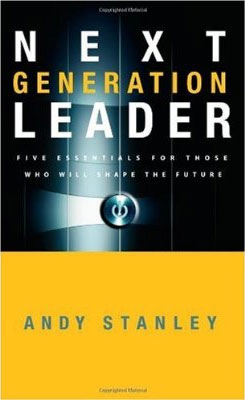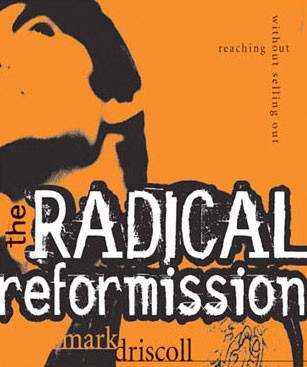Aug
15
2011
or Never Waste a Good Crisis
 We moderns don’t like uncertainty. It reminds us that we are not God. Over the centuries we’ve progressed from not naming children until they are 7 (in case they died and the name was wasted) to designer foetuses. But uncertainty is part of God’s process of bringing us to maturity. He blesses those willing to take risks for Him and His honour.
We moderns don’t like uncertainty. It reminds us that we are not God. Over the centuries we’ve progressed from not naming children until they are 7 (in case they died and the name was wasted) to designer foetuses. But uncertainty is part of God’s process of bringing us to maturity. He blesses those willing to take risks for Him and His honour.
Andy Stanley highlights the benefits of uncertainty:
Continue reading
Comments Off | tags: Andy Stanley, Leadership | posted in Christian Life, Quotes
Aug
9
2011

or Why Don’t You Come Join My Party?
Mark Driscoll used a combination of conservative doctrine and cultural liberalism to build his church. Some snippets from Mark Driscoll’s book The Radical Reformission:
Reformission evangelism, patterned after the example of Jesus, is particularly appropriate for our current economy, in which people live much of their lives pursuing experiences… Reformission evangelism to our growing experience economy will require Christians and churches to steep the gospel in the culture with increasing creativity, hospitality, and authenticity. This is necessary because lost people living in an experience-based economy are willing to immerse themselves in the life of a Christian community to experience it for themselves and to see firsthand the experiences of people Jesus has transformed.
Continue reading
4 comments | tags: Culture, Evangelism, Mark Driscoll | posted in Biblical Theology, Quotes
Aug
8
2011

Doug Wilson writes: “In and through the sacraments, God winnows, divides, nourishes, establishes, and gloriously saves. He did this throughout the course of the OT narrative, and He is doing it now.” [1]
I agree with this statement entirely, except that the New Covenant body is entirely “priestly.” The Table is not primary education, but secondary. It is not the preaching of the gospel to the unconverted, but the memorial of it by the converted.
Continue reading
6 comments | tags: Baptism, Communion, Covenant Theology, Doug Wilson | posted in Bible Matrix, Biblical Theology, Quotes
Aug
7
2011

Oh, to entwine the thread of prayer around
These cares and woes, the daily, hourly cares,
Continue reading
Comments Off | tags: Poetry | posted in Christian Life, Quotes
Aug
6
2011

More than thirty years after the release of their hit song, “Down Under,” (1978) Australian rock band Men at Work were hauled into court for ripping their flute riff from a nursery rhyme. The issue came up after discussion on a popular rock quiz TV show. [1]
Most Aussies of my generation knew the original (really uncool) song, and the use of it as a motif in a rock song was, well, really cool. The very fact that it didn’t have a big yellow sticker on it saying “This bit is from Kookaburra,” and the listener picked it up, was gratifying. All good music does this. All good movies do this. TV shows also use subtle allusions to past episodes as a nod to faithful viewers (and no show does it with the concrete-cracking understatement of Mad Men).
In this case of the flute riff, any dunderhead could pick it up. While I think that the current owners of the copyright, Larrikin Records, are a bunch of opportunistic bastards (and though they were once considered indie and cool, I guess they are now really uncool), it pains me that modern teachers of the Bible are too cautious to read the Scriptures in this way, too conservative to pick up the motifs, phrases and structural allusions that are obvious once they are pointed out. They are looking for the big yellow sticker, and it ain’t coming.
Continue reading
3 comments | tags: Darren Doane, Hermeneutics, James Jordan, Music, Systematic typology, Typology | posted in Biblical Theology, Quotes
Aug
4
2011

“Courage is the flower of conviction.”
When Christians speak of “cultural engagement,” what comes to mind? Are we thinking diamond rings or swords and strategies?
Jefferey Ventrella again:
Postmillennialism provides a biblically tenable basis for hope in God’s future grace. But we must not forget that God’s decree ordains both the end as well as the means. Christians must “work out their own salvation,” and this means ethical living by God’s holy standard, that is, theonomic living…
Continue reading
Comments Off | tags: Culture, Jeffery Ventrella, Postmillennialism | posted in Biblical Theology, Christian Life, Quotes
Aug
2
2011

Jeffery Ventrella writes:
If theonomic postmillennialism is true—and it certainly is—then what differences here and now should this conviction make in the lives of Christians and their churches? What should be the character, and what should be the conduct of a professing postmillennialist?
Continue reading
Comments Off | tags: Dominion Theology, Evangelism, Jeffery Ventrella, Postmillennialism | posted in Christian Life, Quotes
Jul
31
2011

A fascinating article by Peter Leithart for Biblical Horizons:
But Michael the archangel, when he disputed with the devil and argued about the body of Moses, did not dare pronounce against him a railing judgment, but said, “The Lord rebuke you” (Jude 9).
Jude 9 raises several difficulties (though not insuperable difficulties) for conservative commentators. The event that Jude recounts does not seem to be drawn from the Old Testament, and most scholars claim, based on statements of Clement of Alexandria and Origen, that Jude borrowed this story from the Assumption of Moses, an apocryphal work.
Continue reading
1 comment | tags: Jude, Peter Leithart, Zechariah | posted in Biblical Theology, Quotes, The Restoration Era
Jul
28
2011

The Bible so often seems to be very descriptive when we don’t want it to be (concerning architecture, for instance) and threadbare when it comes to the personal and illustrative detail we have been trained to enjoy and rely upon. When it comes to characterization especially, somehow the authors do a whole lot with very little. In fact, the unfathomable depth of what they do could not be achieved in any other way. What we moderns have often classed as primitive literature is in fact a literary world whose navigation requires one to keep one’s wits every step of the way. What is not said very often speaks volumes, especially when a passage is repeated with minor tweaks, additions or omissions. The Bible is most definitely smarter than we are, and its literary strategy can be traced back to Eden.
Robert Alter asks:
How does the Bible manage to evoke such a sense of depth and complexity in it representation of character with what would seem to be such sparse, even rudimentary means?
Continue reading
1 comment | tags: Genesis, Literary Structure, Robert Alter | posted in Apologetics, Quotes
Jul
27
2011
A truly “catholic” church has universal appeal. It doesn’t pander to diverse audience. And it simply can’t be that diverse anyhow. Terry Johnson writes:
Continue reading
2 comments | tags: Culture, Ecclesiology | posted in Biblical Theology, Quotes
 We moderns don’t like uncertainty. It reminds us that we are not God. Over the centuries we’ve progressed from not naming children until they are 7 (in case they died and the name was wasted) to designer foetuses. But uncertainty is part of God’s process of bringing us to maturity. He blesses those willing to take risks for Him and His honour.
We moderns don’t like uncertainty. It reminds us that we are not God. Over the centuries we’ve progressed from not naming children until they are 7 (in case they died and the name was wasted) to designer foetuses. But uncertainty is part of God’s process of bringing us to maturity. He blesses those willing to take risks for Him and His honour.
































